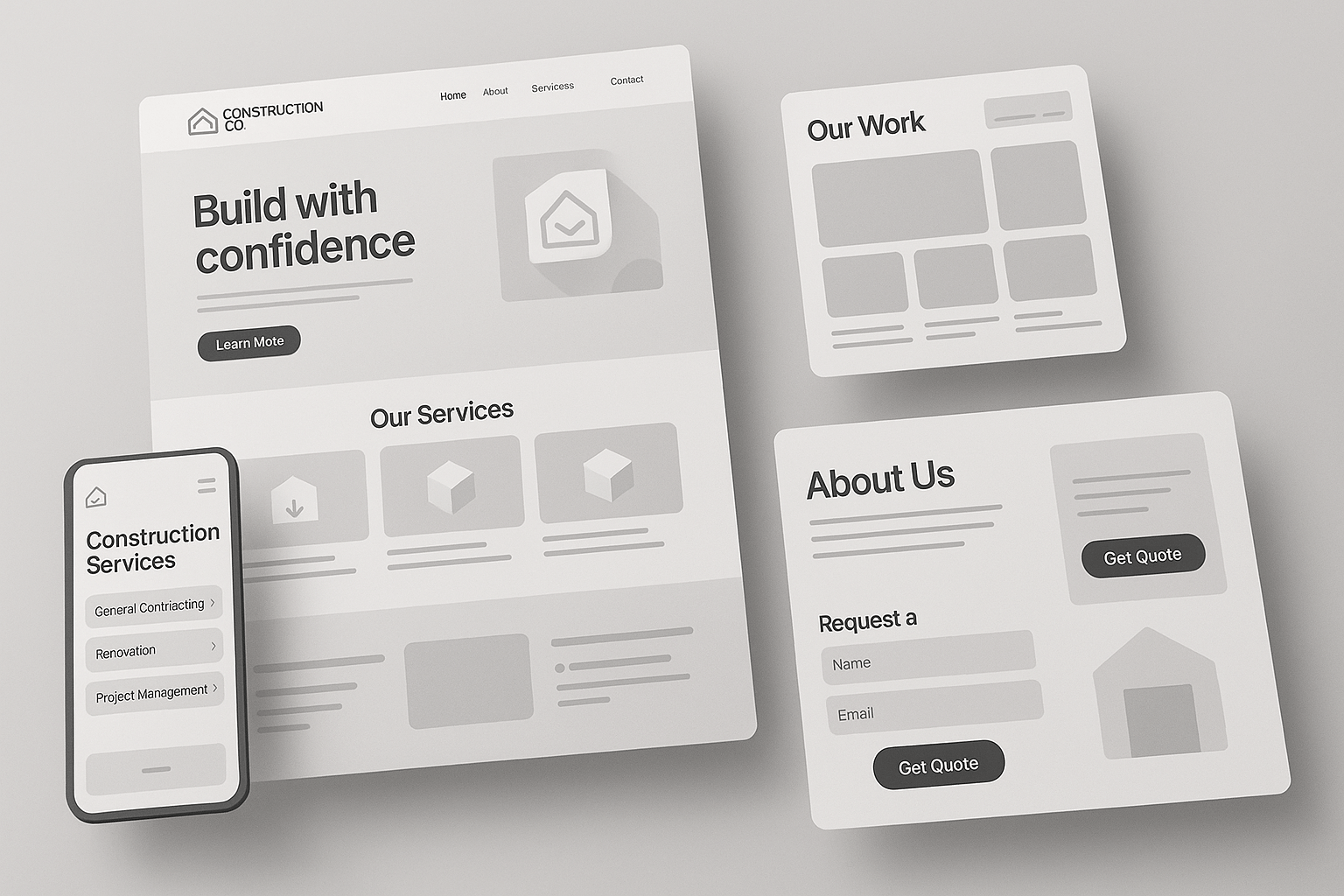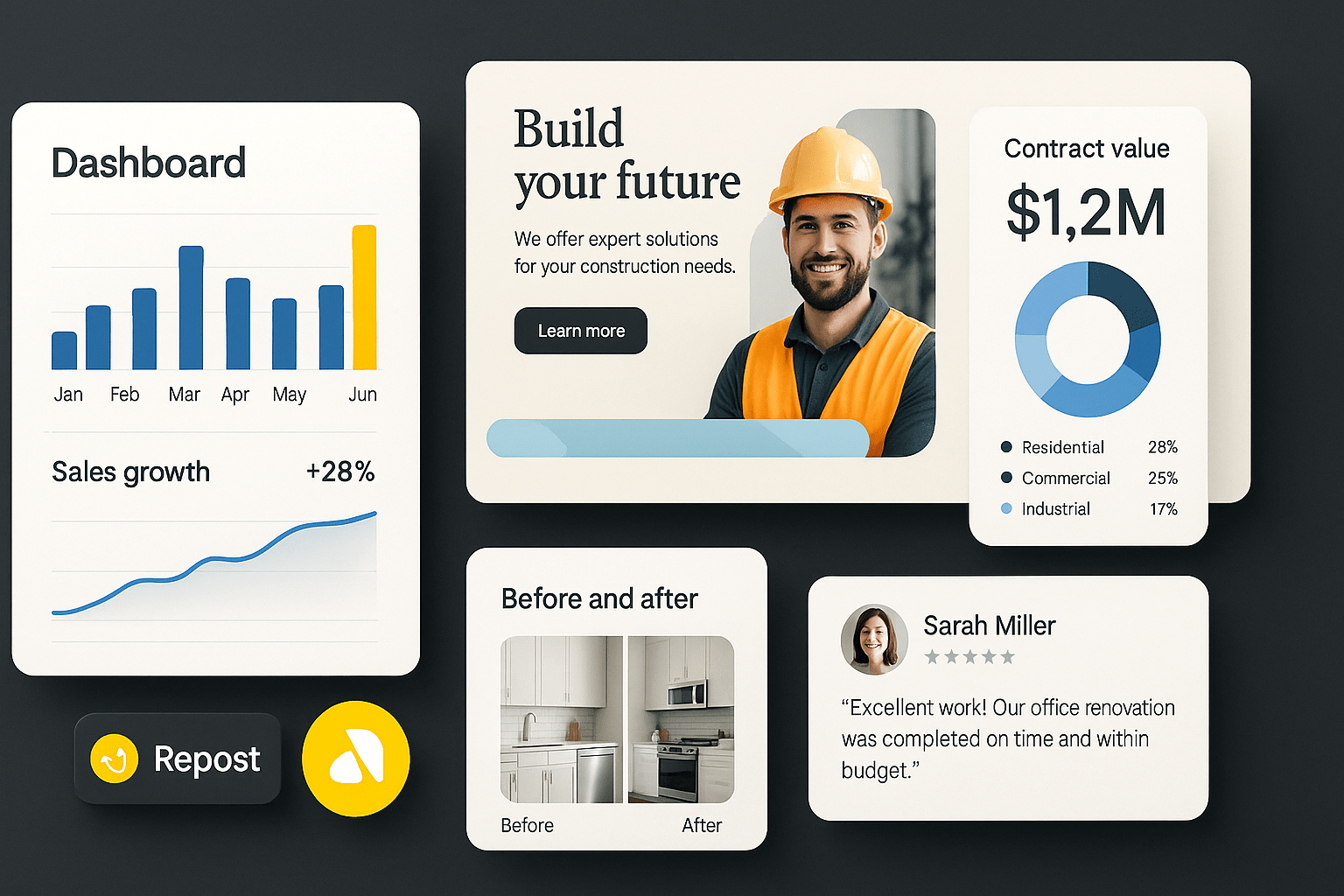How Web Development Transforms Construction Businesses
by Design Delulu Editorial · September 21, 2025

The construction industry has traditionally relied on word-of-mouth referrals, paper-based processes, and face-to-face meetings to conduct business. However, as digital transformation sweeps across every sector, construction companies that fail to establish a strong online presence risk being left behind. Web development for construction businesses isn't just about having a website—it's about creating digital solutions that streamline operations, attract clients, and build lasting relationships in an increasingly competitive marketplace.
Modern construction businesses face unique challenges that require innovative digital solutions. From showcasing complex projects to managing client communications and generating leads, the right web development approach can transform how construction companies operate and grow. This comprehensive guide explores how strategic web development can revolutionize your construction business and position you for long-term success.

Why Construction Businesses Need Web Development
Key Challenges Construction Companies Face
Construction businesses operate in a highly competitive environment where trust, credibility, and visibility are paramount. Many construction companies struggle with several critical challenges that web development can directly address.
- Limited Online Visibility: Most construction businesses rely heavily on local referrals and traditional marketing methods, missing out on the vast potential of online lead generation. Without a strong digital presence, potential clients can't find your services when searching for construction solutions online.
- Difficulty Showcasing Work: Construction projects are visual by nature, yet many companies lack effective platforms to display their portfolio, project timelines, and capabilities. Static brochures and word-of-mouth descriptions simply can't compete with dynamic, interactive showcases of completed work.
- Inefficient Client Communication: Managing multiple projects, client updates, and team coordination through phone calls and emails creates bottlenecks and miscommunications that can derail projects and damage client relationships.
- Lead Generation Limitations: Traditional marketing methods like Yellow Pages ads and print materials offer limited targeting and measurable results, making it difficult to track return on investment and optimize marketing efforts.
How Web Development Solves These Problems
Strategic web development addresses each of these challenges through targeted digital solutions that work around the clock to grow your business.
- Enhanced Online Presence: A professionally developed website establishes credibility and makes your business discoverable through search engines, social media, and online directories. This 24/7 digital storefront captures leads even when your office is closed.
- Dynamic Project Showcases: Modern web development enables interactive galleries, project timelines, and detailed case studies that demonstrate your expertise far more effectively than traditional marketing materials ever could.
- Streamlined Communication Systems: Integrated client portals, project management tools, and automated update systems keep clients informed and engaged throughout the construction process while reducing administrative overhead.
- Data-Driven Lead Generation: Web development creates measurable marketing channels through SEO optimization, conversion tracking, and targeted landing pages that generate qualified leads and provide clear ROI metrics.

Essential Features of Web Development for Construction Businesses
Must-Have Tools and Design Elements
Successful construction websites require specific features tailored to the industry's unique needs and client expectations. These essential elements work together to create a comprehensive digital presence that drives results.
- Project Portfolio with High-Quality Visuals: Your website must showcase completed projects through professional photography, 360-degree virtual tours, and detailed project descriptions. Include before-and-after comparisons, construction timelines, and client testimonials for each featured project.
- Service-Specific Landing Pages: Create dedicated pages for each service you offer—residential construction, commercial building, renovations, or specialty work. Each page should include detailed descriptions, pricing information, and clear calls-to-action.
- Mobile-Responsive Design: Construction clients often research contractors on mobile devices while visiting job sites or meeting with architects. Your website must provide an optimal experience across all devices and screen sizes.
- Client Portal Integration: Develop secure client areas where customers can view project progress, access documents, communicate with your team, and approve changes. This transparency builds trust and reduces time spent on status update calls.
- Quote Request Systems: Implement user-friendly forms that capture project details, contact information, and timeline requirements. Automated follow-up sequences ensure no potential client falls through the cracks.
Real-World Examples
- Interactive Project Maps: Construction companies specializing in commercial development can integrate interactive maps showing completed projects throughout their service area, allowing visitors to explore their local presence and expertise.
- Progress Tracking Dashboards: Residential contractors can offer clients real-time access to project schedules, photo updates, and milestone completions through custom web applications that replace traditional paper-based communication.
- Estimate Calculators: Web-based tools that help potential clients estimate costs for common projects like kitchen renovations or additions can capture leads while providing immediate value to website visitors.
- Subcontractor Portals: Larger construction companies can develop specialized areas for subcontractors to access project documents, submit bids, and coordinate schedules, streamlining the entire project management process.

Common Mistakes to Avoid
Typical Pitfalls in Web Development for Construction Businesses
Many construction companies make critical errors when developing their digital presence, undermining their investment and missing opportunities to connect with potential clients.
- Generic Template Websites: Using cookie-cutter website templates that look identical to competitors fails to differentiate your business or showcase your unique value proposition. Generic designs signal to clients that your company takes shortcuts rather than delivering custom solutions.
- Neglecting Local SEO: Construction businesses serve specific geographic areas, yet many websites fail to optimize for local search terms, missing opportunities to appear in "near me" searches that drive high-quality leads.
- Overwhelming Navigation: Complex menu structures and information overload confuse visitors and increase bounce rates. Construction websites need clear, intuitive navigation that guides visitors toward taking action.
- Ignoring Loading Speed: Large, unoptimized images and poorly coded websites create slow loading times that frustrate visitors and hurt search engine rankings. Construction sites often feature many high-resolution project photos, making optimization crucial.
- Missing Trust Signals: Failing to prominently display licenses, insurance information, industry certifications, and customer reviews undermines credibility in an industry where trust is paramount.
How to Do Better
- Invest in Custom Design: Work with web developers who understand the construction industry and can create unique designs that reflect your company's personality and expertise. Custom development allows for specialized features that set you apart from competitors.
- Prioritize Local Optimization: Implement location-specific keywords, create Google My Business listings, and develop content that addresses local building codes, regulations, and market conditions.
- Simplify User Experience: Design clear navigation paths that lead visitors from problem identification to solution discovery to contact initiation. Use prominent calls-to-action and minimize the steps required to request quotes.
- Optimize Performance: Compress images, implement caching strategies, and choose reliable hosting solutions that ensure fast loading times even with media-rich content.
- Build Credibility: Prominently display professional credentials, insurance information, Better Business Bureau ratings, and detailed client testimonials with photos and project details.
SEO / Growth Best Practices
Optimization Tips Specific to Construction Businesses
Search engine optimization for construction companies requires industry-specific strategies that account for local competition, seasonal trends, and the unique ways potential clients search for construction services.
- Target Long-Tail Keywords: Focus on specific phrases like "custom home builders in [city]" or "commercial roofing contractors [location]" rather than competing for broad terms like "construction." These targeted keywords attract more qualified leads and face less competition.
- Create Location-Specific Content: Develop detailed pages for each city or region you serve, including information about local building permits, architectural styles, and community-specific projects you've completed.
- Optimize for Voice Search: Many construction clients use voice search to find contractors while multitasking on job sites. Optimize for conversational queries like "Who are the best contractors near me?" or "How much does it cost to build a deck?"
- Leverage Google My Business: Maintain accurate business information, regularly post project updates and photos, respond to reviews promptly, and use Google Posts to highlight current promotions or completed projects.
- Build Authority Through Content: Create valuable resources like building guides, permit information, design trend articles, and project planning checklists that establish your expertise and attract inbound links.
Leveraging Web Development for Visibility and Results
Strategic web development goes beyond basic SEO to create comprehensive growth engines that consistently attract and convert potential clients.
- Conversion Rate Optimization: Implement A/B testing on landing pages, quote request forms, and call-to-action buttons to continuously improve the percentage of visitors who become leads.
- Marketing Automation Integration: Connect your website to email marketing systems that nurture leads through the long construction sales cycle with project showcases, educational content, and timely follow-ups.
- Analytics and Performance Tracking: Install comprehensive tracking systems that measure not just website traffic, but lead quality, conversion sources, and customer lifetime value to optimize marketing investments.
- Social Media Integration: Connect your website to social media profiles where you regularly share project updates, behind-the-scenes content, and customer success stories that build community engagement and referral opportunities.
- Content Marketing Systems: Develop blog sections, resource libraries, and downloadable guides that attract organic search traffic and position your company as the go-to expert in your market.
The construction industry's digital transformation creates unprecedented opportunities for companies willing to invest in professional web development. By addressing industry-specific challenges through custom digital solutions, construction businesses can build stronger client relationships, generate more qualified leads, and establish sustainable competitive advantages.
Success requires more than just having a website—it demands strategic thinking, industry expertise, and ongoing optimization to stay ahead of evolving client expectations and search engine algorithms. Construction companies that embrace comprehensive web development strategies position themselves for growth while their competitors struggle with outdated marketing approaches.
Ready to improve your construction business with web development? Explore Design Delulu's Web Development to discover how professional web development can transform your construction company's digital presence and drive measurable business growth.
Additional Resources
Ready to take the next step? Explore these valuable resources:
- View Our Portfolio - See examples of our web development work for construction and other industries
- Book a Call - Schedule a consultation to discuss your construction business's web development needs
- Design Tools - Access helpful tools and resources for your business
👉 Ready to improve your construction businesses with web development? Explore Web Development at Design Delulu